Fishing certainly has a way of luring many of us into its serene and captivating world, yet it’s not always as tranquil as the calm waters suggest. Oh yes, I can relate to those puzzling moments grappling with my seemingly rebellious gear or navigating unexpected events – even after numerous trips down the fishing lane! Fortunately, relentless research paired with my personal share of fishing tours have culminated in 15 essential safety precautions every angler should master.
Are you ready to embark on this journey towards becoming a safer fisherman? Let’s drop anchor and explore!
Importance of Fishing Safety Precautions
Fishing safety precautions are essential for avoiding accidents and injuries, as well as protecting the environment.
Avoiding accidents and injuries
Getting hurt is bad. I take care to avoid cuts or falls when I fish. Hooks and rods can be tricky things to use! They can cut or poke me if I’m not careful. It’s best to pay close attention when using them, like when putting bait on a hook or taking off a catch.
And it may sound odd, but my shoes help too. They keep me safe from sharp objects on the ground. Casting needs its own set of rules too – always check around before you cast so you don’t hit anyone by accident! Fishing equipment can bring pain if we don’t use it right, but with these steps I stay safe while fishing.
Protecting the environment
Going fishing is fun but we have a part to play in looking after our world. We should always clean up once we’re done. This means picking up any bait, hooks, and other litter. It helps keep the water and land safe for plants and animals.
Catching fish also needs care when you put them back in the water if they are too small or out of season. Make sure your hands are wet before touching the fish as dry hands can hurt its skin and scales.
Now you know! With these steps, each one of us does our bit to protect the environment while enjoying fishing safely.
Mastering 15 Effective Tips for Fishing Safety Precautions
As a fishing enthusiast, I know the importance of safety. There are 15 tips I use to keep myself safe:
- I always pick a good spot for fishing.
- I learn about local fishing rules before I go.
- To stay safe, I wear the right gear.
- A life jacket is key.
- I protect my eyes with shades or hats.
- My kit includes a first aid box.
- Sharp things like hooks need careful handling.
- Casting is done with caution to avoid hurting others or myself.
- Checking the weather helps me avoid bad situations.
- If there’s a storm or strong winds, I don’t fish.
- When on a boat, following boating guidelines keeps me safe and sound.
- Before heading out, someone should know my plan in case something goes wrong.
- Drinking water and dressing correctly stops me from feeling sick from sun and heat.
- To help nature, I follow catch and release steps and don’t leave trash behind.
- Lastly, knowing the local rules such as size limits helps me enjoy fishing without trouble.
Choose the Right Fishing Spot
When choosing a fishing spot, it is important to research local fishing regulations and consider the conditions and potential hazards.
Research local fishing regulations
I always make sure to research the local fishing regulations before heading out. It’s important to know the rules and guidelines in the area you’re fishing in. Here are some key things to remember:
- Check if you need a fishing license. In Colorado, adults aged 16 and older are required to purchase and carry a physical fishing license.
- Look for any size and bag limits that may be in place. It’s important to know how many fish you can keep and what sizes are allowed.
- Find out about fishing seasons and closures. Some areas have specific times when fishing is allowed or areas that are temporarily closed for conservation purposes.
- Take note of any special regulations, such as catch and release requirements or gear restrictions. These rules help protect the fish population and habitat.
Consider the conditions and potential hazards
When choosing a fishing spot, it is important to consider the conditions and potential hazards. Evaluating the conditions of the fishing spot can help prevent accidents and ensure your safety.
Look out for any obstacles or dangers in the water, such as submerged rocks or fallen trees. Pay attention to the weather conditions before heading out, as storms or high winds can make fishing unsafe.
By being aware of any potential hazards at your chosen fishing spot, you can have a safer and more enjoyable experience.
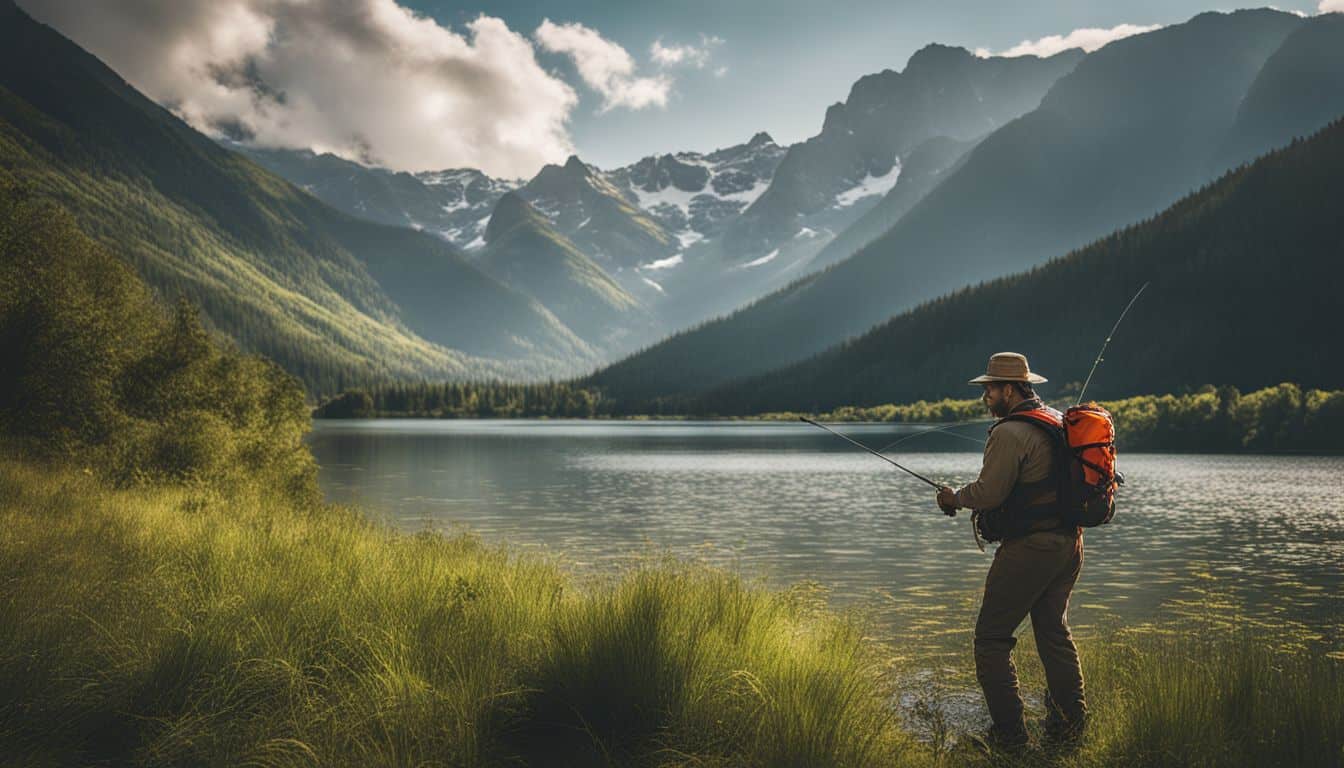
Use Proper Safety Gear
Wear a U.S. Coast Guard approved life jacket, use protective eyewear, and always have a first aid kit on hand.
Wear a U.S. Coast Guard approved life jacket
When you go fishing, it’s important to wear a U.S. Coast Guard approved life jacket. Life jackets are crucial for your safety on the water, especially if you’re boating or fishing from a boat.
They can help prevent drowning and keep you afloat in case of an accident. Did you know that wearing a life jacket can prevent about 50% of drowning deaths related to recreational boating? So make sure to choose a life jacket that is approved by the U.S. Coast Guard and fits properly, ensuring that it is snug but not too tight.
Your safety should always come first when you’re out enjoying the water!
Use protective eyewear
One important tip for fishing safety is to use protective eyewear. Wearing safety glasses or sunglasses can help protect your eyes from harmful UV rays and reduce eye strain while you’re out on the water.
Polarized sunglasses are especially recommended because they can help you spot fish more easily by reducing glare off the water’s surface. It’s not just about improving visibility, though – wearing protective eyewear also helps prevent sports-related eye injuries, which is why organizations like the American Academy of Pediatrics and Academy emphasize its importance.
So whether you’re a fishing enthusiast or a young athlete, don’t forget to prioritize your eye safety by wearing proper eyewear while fishing.
Have a first aid kit on hand
It’s important to have a first aid kit when you go fishing. Accidents can happen, and having emergency medical supplies close by can help prevent injuries from getting worse. Your first aid kit should include items like antiseptic solution and bandages, as well as any necessary safety gear.
Even if you don’t end up needing it, it’s better to be prepared just in case. So make sure you have a first aid kit on hand before your next fishing trip.
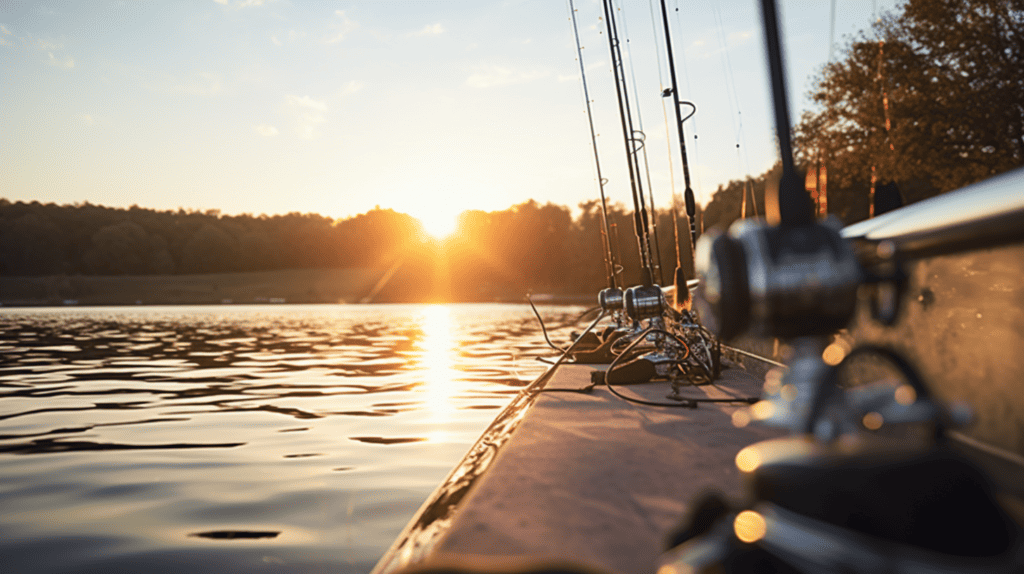
Handle Fishing Equipment Safely
When handling fishing equipment, it is crucial to exercise caution and ensure your safety at all times. Learn how to properly handle hooks and sharp objects, as well as use caution when casting.
To discover more essential tips for safe fishing practices, continue reading!
Properly handle hooks and sharp objects
When it comes to fishing safety, one important aspect is properly handling hooks and sharp objects. Fishing injuries often occur due to mishandling these tools. It is crucial to teach children in fishing groups about the dangers of hooks and sharp tackle and show them the correct way to handle them.
This includes being aware of where the hooks are pointing, keeping fingers away from barbs, and using caution when removing fish from hooks. By practicing safe handling techniques, we can prevent accidents and enjoy a safer fishing experience.
Use caution when casting
When casting while fishing, it is important to be cautious and aware of your surroundings. Before you cast, take a moment to look around and make sure that no one is near the area where you will be casting.
This simple step can help prevent accidents and ensure the safety of those around you. Additionally, consider using safety measures such as placing cones, caution tape, or flagging around your casting area to alert others to stay clear.
By practicing caution when casting, we can enjoy our fishing experience without any unnecessary risks or injuries.
Be Aware of Weather Conditions
Check the forecast before heading out and avoid fishing during thunderstorms or high winds. Being aware of weather conditions is crucial for your safety on the water. Keep reading to discover more essential tips for mastering fishing safety precautions.
Check the forecast before heading out
Before going fishing, it’s important to check the weather forecast. Weather conditions can greatly impact your fishing experience and safety. By checking the forecast, you can determine if it’s a good day for fishing or if there are any potential risks, such as thunderstorms or high winds, that could make it unsafe to be out on the water.
Knowing what the weather will be like can help you plan and prepare accordingly, ensuring a safer and more successful fishing trip. So always take a few moments to check the forecast before heading out on your fishing adventure.
Avoid fishing during thunderstorms or high winds
When it comes to fishing safety, it’s important to be aware of the weather conditions. Avoid fishing during thunderstorms or high winds because lightning can strike as far as ten miles away from its source cloud.
If you’re out on a boat and a storm approaches, seek shelter on shore as quickly as possible. Stormy weather may be more favorable for fishing, but safety should always come first.
Stay informed about the forecast and make sure to prioritize your well-being when deciding whether or not to go fishing in stormy conditions.
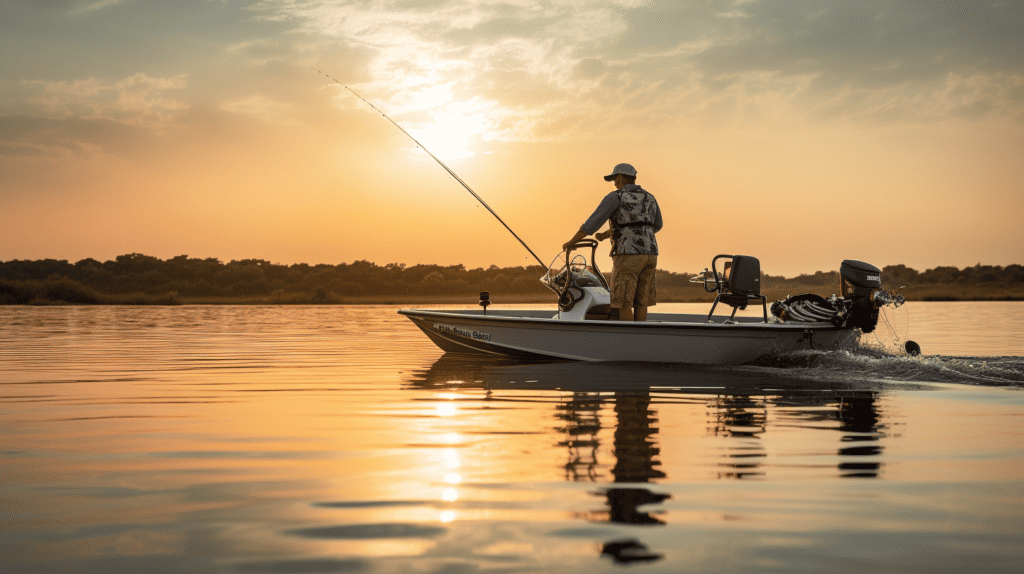
Practice Boat Safety
Follow boating regulations and guidelines, such as having a float plan and using a kill cord when operating a motorized boat. These tips will help ensure your safety on the water. So grab your life jacket and let’s dive into the rest of these essential fishing safety precautions!
Follow boating regulations and guidelines
Following boating regulations and guidelines is crucial to ensure your safety while out on the water. It’s important to be aware of and adhere to these rules to prevent accidents and protect yourself and others. Here are some key tips for boating safety:
- Always wear a life jacket: Make sure everyone on the boat wears a properly fitting life jacket, as this can greatly increase your chances of surviving an accident.
- Know the different types of life jackets: There are various types of life jackets available, each suited for different boating situations. Use the appropriate one based on your activity and location.
- Avoid alcohol consumption: It’s best to avoid consuming alcohol before or during a boating trip, as it impairs judgment and reaction time, increasing the risks of accidents.
- Take a boating safety course: Consider taking a boating safety course to learn valuable skills and knowledge about safe boating practices. This can help you navigate through various situations confidently.
- Follow a pre-departure checklist: Before setting off, go through a pre-departure checklist to ensure that all necessary safety measures are taken. This includes checking communication devices, navigation equipment, fuel levels, and emergency supplies.
- Stay informed about weather conditions: Check the weather forecast before heading out and monitor any changes throughout your trip. Avoid going out in severe weather conditions like storms or high winds.
- Use common sense: Trust your instincts and use common sense while out on the water. Avoid reckless behaviors, maintain a safe speed, stay alert for other boats or hazards, and be considerate towards fellow boaters.
Have a float plan and let someone know your plans
I always make sure to have a float plan and let someone know my plans before I go fishing. It’s an important safety precaution that can help in case of emergencies. A float plan includes information about your trip, such as the vessel description, number of people on board, destination and route, contact details, and how long you’ll be gone.
This way, if something goes wrong and you don’t return as expected, authorities can be alerted and come to your rescue. Having a float plan is responsible and can really make a difference in ensuring your safety while out on the water.
Use a kill cord when operating a motorized boat
When operating a motorized boat, it’s important to use a kill cord. A kill cord is a short lanyard that connects to the driver of the boat or personal watercraft. Its purpose is to stop the engine if the driver becomes disconnected from the controls.
This safety feature helps prevent accidents and injuries on the water. In fact, starting from April 1, 2021, many boaters in the United States are required by law to use an engine cut-off switch with a kill cord.
So make sure you always use a kill cord when operating your motorized boat to stay safe on the water.
Stay Hydrated and Protect Against the Sun
To stay safe while fishing, it is important to stay hydrated by drinking plenty of water and protect yourself from the sun by wearing sunscreen and protective clothing.
Drink plenty of water
Staying hydrated is really important when you’re out fishing. It’s easy to get dehydrated, especially if it’s hot outside. That’s why it’s a good idea to bring plenty of water with you on your fishing trips.
Drinking lots of fluids can help prevent dehydration and keep you feeling good while you’re enjoying the great outdoors. Remember, the sun can be really strong when you’re by the water, so it’s important to protect yourself from harmful UV rays.
Drinking plenty of water and wearing sunscreen are both ways to take care of yourself while you’re out fishing. So don’t forget to stay hydrated and protected from the sun!
Wear sunscreen and protective clothing
Protecting your skin from the sun’s harmful rays is crucial when you’re out fishing. Wearing sunscreen with at least SPF 15 and reapplying it regularly will help prevent sunburns and protect your skin from damage.
Make sure to wear sun-protective clothing, like a loose-fitting long-sleeved shirt and long shorts, to shield yourself from UV rays. Don’t forget to wear sunglasses, preferably polarized, and a hat for extra protection.
Keeping yourself covered and applying sunscreen will ensure that you can enjoy your fishing trip without worrying about getting burned or damaging your skin.
Respect Wildlife and the Environment
Respecting wildlife and the environment is crucial for maintaining the balance of ecosystems.
Follow catch and release guidelines
When practicing catch and release, it’s important to follow guidelines to protect the fish and their environment. Handle the fish with care, avoiding any unnecessary harm. Don’t gaff a fish that you plan on releasing, as this can cause serious injury.
Instead, dehook the fish in the water to minimize harm. Cut the line as close to the hook as possible before releasing them back into their natural habitat. By following these guidelines and using proper catch and release techniques, we can help minimize mortality rates and ensure the sustainability of our fisheries for future generations.
Dispose of trash properly
When fishing, it’s important to dispose of trash properly to protect the environment and wildlife. Improper disposal of fish waste can pose risks to both public health and the ecosystem.
Make sure to clean up after yourself by packing out all trash and garbage. This includes any leftover bait, packaging, or other items you may have brought with you. By doing so, you’re being a responsible angler and showing respect for nature.
Let’s keep our fishing spots clean for everyone to enjoy!
Avoid damaging habitats
Respecting wildlife and protecting their habitats is crucial for maintaining a healthy environment. By avoiding damaging habitats, we can help preserve biodiversity and ensure the sustainability of fish populations.
This means following catch and release guidelines, disposing of trash properly, and being mindful of where we fish. Additionally, it’s important to inspect waterfronts daily to avoid fishing in restricted areas and stay aware of any changes in the natural environment.
Let’s be responsible fishermen by taking care of our surroundings and supporting habitat restoration efforts. Together, we can make a positive impact on our ecosystems.
Learn and Follow Local Fishing Regulations
To ensure a successful and responsible fishing trip, it is crucial to learn and follow local fishing regulations. These regulations include knowing the size and bag limits for different species, obtaining the necessary licenses and permits, as well as respecting fishing seasons and closures.
By adhering to these guidelines, we can contribute to the sustainability of our fisheries and protect fish populations for future generations.
Know size and bag limits
As a fishing enthusiast, it’s important for me to know and follow the size and bag limits set by local fishing regulations. Here are some key things to keep in mind:
- Understand the purpose: Size and bag limits are put in place to reduce fishing pressure on certain sizes of fish. This helps maintain healthy fish populations and ensures a sustainable fishery.
- Learn the restrictions: Each location may have different limits, so it’s crucial to familiarize yourself with the specific regulations in your area. Check for any updates or changes before you head out.
- Respect the catch and release guidelines: If there are size restrictions, make sure to release any fish that don’t meet the minimum size requirement. This allows them to grow and reproduce, contributing to a thriving ecosystem.
- Follow catch limits: Bag limits specify how many fish of a certain species or in total can be kept per day or trip. Exceeding these limits can harm fish populations and disrupt their natural balance.
- Obtain necessary licenses and permits: To ensure compliance with fishing rules, make sure you have the appropriate licenses and permits required in your area. This helps support conservation efforts and responsible fishing practices.
Obtain the necessary licenses and permits
To fish legally and responsibly, it is important to obtain the required licenses and permits. In Iowa, you need to get the proper licenses and permits before casting your line. Familiarize yourself with Iowa’s fishing laws and regulations so that you can stay in compliance.
It’s the same in Texas – if you want to collect fish under a fishing license, make sure you follow the size and bag limits for certain species. And if you’re planning to go fishing in Kentucky, remember that fishing licenses and trout permits are necessary for anyone aged 16 or older.
However, youth aged 15 or younger may be exempt from needing a fishing license in Kentucky. So, before heading out on your next fishing adventure, take the time to educate yourself about the licenses and permits required in your area.
Respect fishing seasons and closures
I always make sure to respect fishing seasons and closures. It’s important because these restrictions are put in place to protect fish populations during their breeding or migration times.
By following these regulations, we can help maintain sustainable fish populations and preserve their habitats. Plus, avoiding fines or penalties is an added bonus! So, whenever I plan my fishing trips, I always check the local regulations to ensure that I’m fishing within the designated seasons and respecting any closures that may be in effect.
Conclusion on Fishing Safety Precautions
In conclusion, mastering fishing safety precautions is crucial for a safe and enjoyable fishing experience. By following these 15 effective tips, such as choosing the right spot, using proper safety gear, being aware of weather conditions, practicing boat safety, respecting wildlife and the environment, and learning and following local fishing regulations, anglers can greatly reduce the risk of accidents or injuries.
So remember to stay hydrated, protect against the sun, handle equipment safely, and always be mindful of your surroundings while on your fishing trips. Happy fishing!
FAQs on Fishing Safety Precautions
1. Why is fishing safety important?
Fishing safety is important to prevent accidents, injuries, and drowning while enjoying the activity.
2. What are some general fishing safety tips I should follow?
Some general fishing safety tips include wearing a life jacket, checking weather conditions before heading out, staying hydrated, and using sunscreen.
3. How can I stay safe when fishing near bodies of water?
To stay safe when fishing near bodies of water, always be aware of your surroundings and avoid standing or walking on slippery surfaces. It’s also important to watch for changing tides or currents.
4. Are there any specific precautions I should take when handling hooks and sharp objects?
Yes, you should handle hooks and sharp objects with caution by wearing protective gloves or using tools like pliers. Keep them securely stored when not in use to avoid accidental injuries.
5. What should I do if someone falls overboard during a fishing trip?
If someone falls overboard during a fishing trip, immediately throw a floatation device towards them and alert others on the boat for help. Avoid jumping into the water yourself unless trained in rescue techniques.

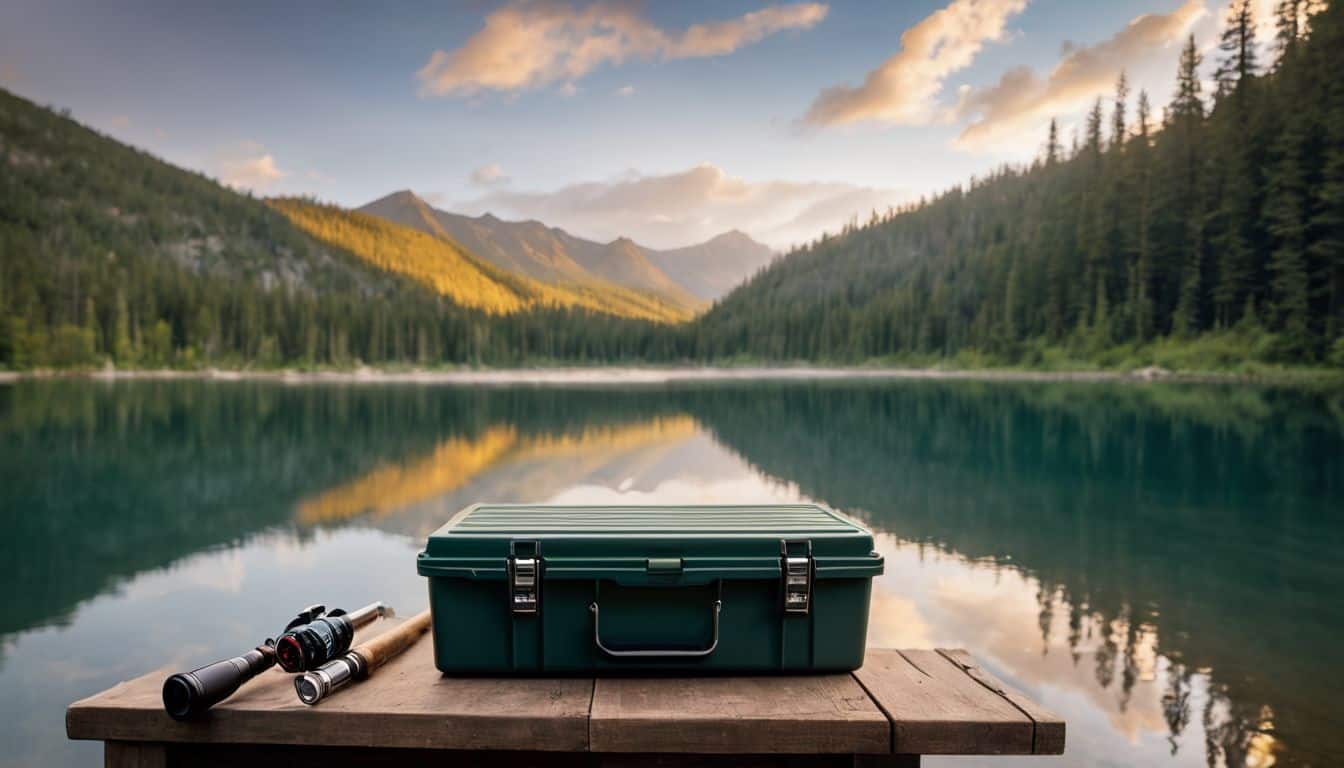
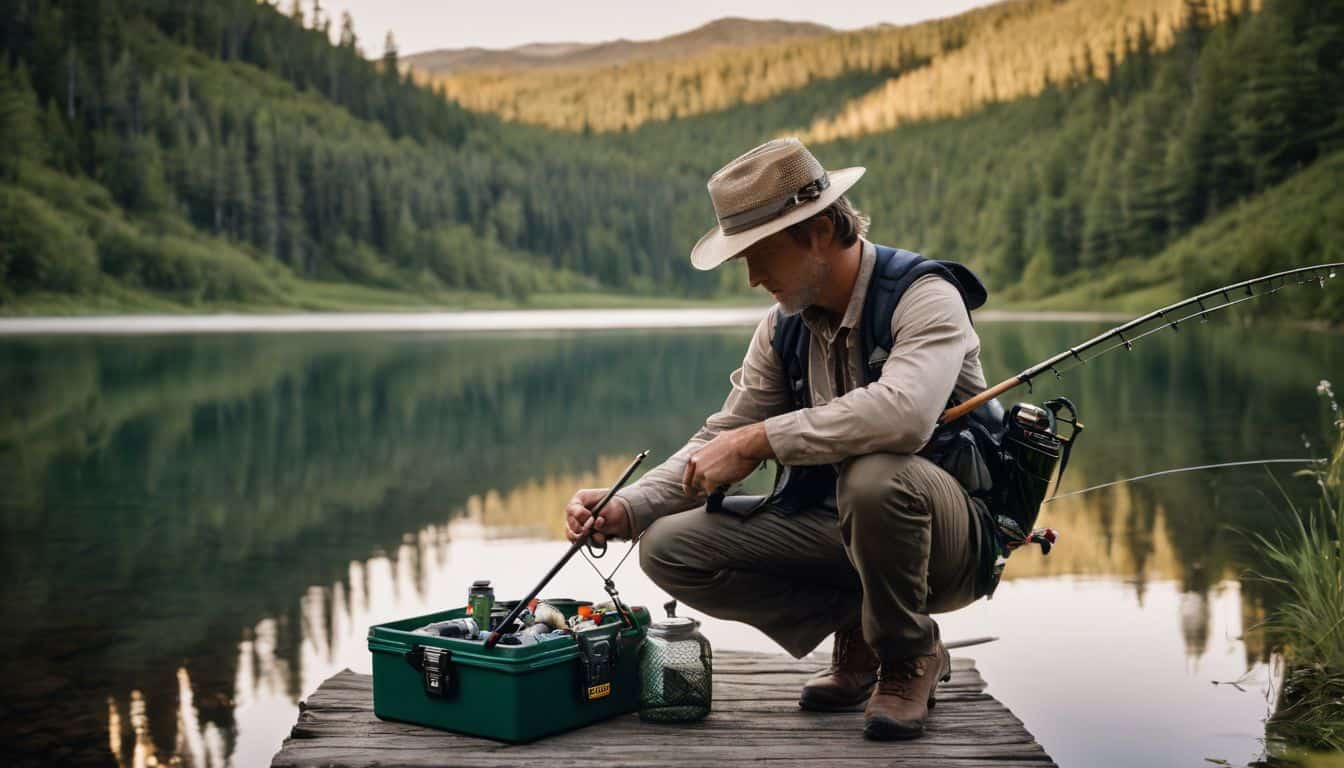
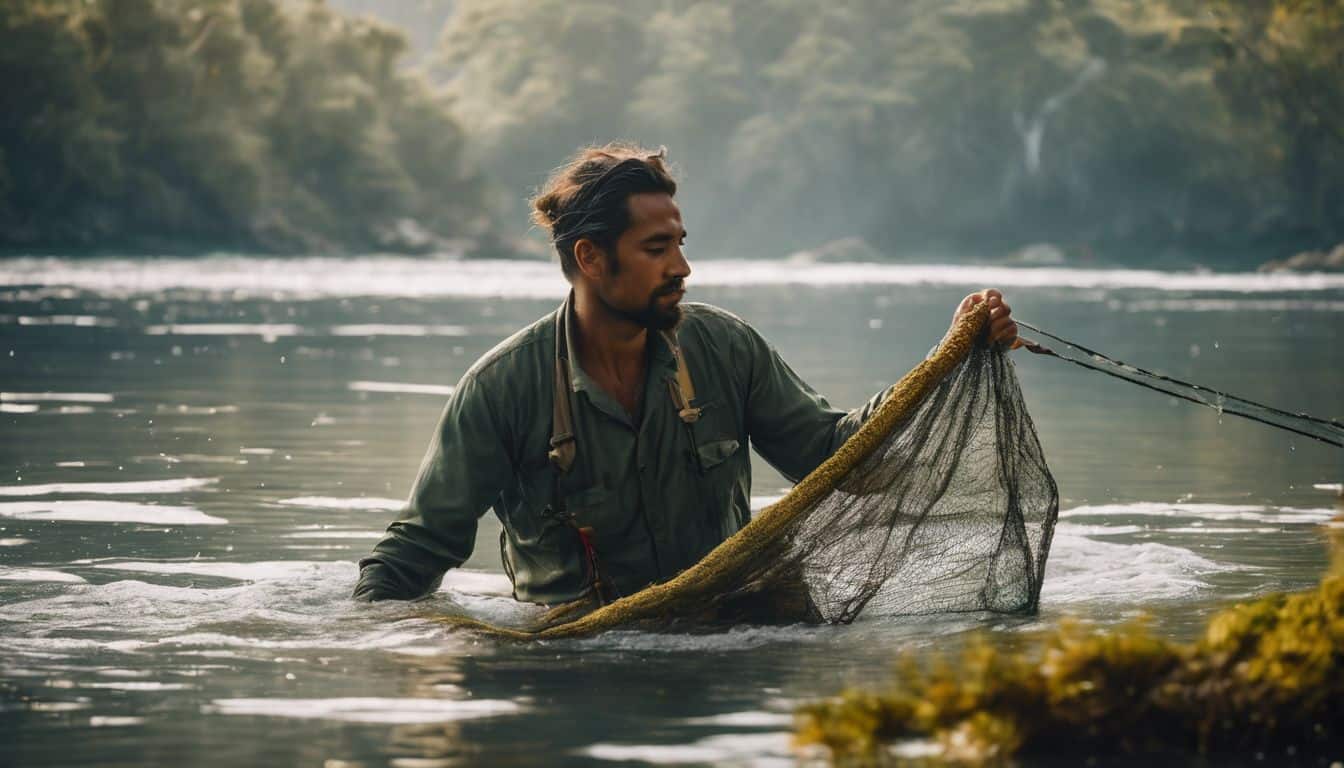
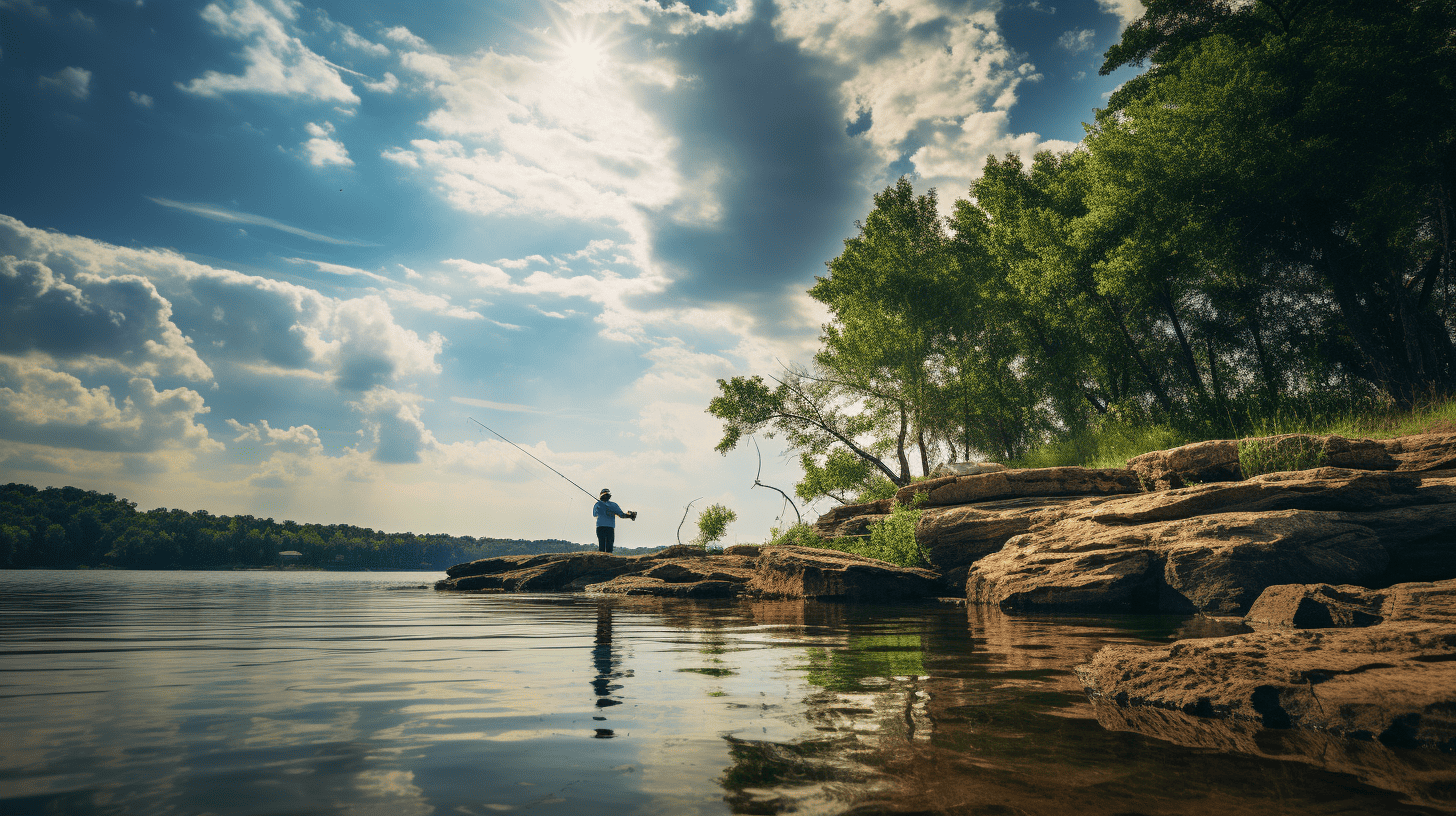
Leave a Reply